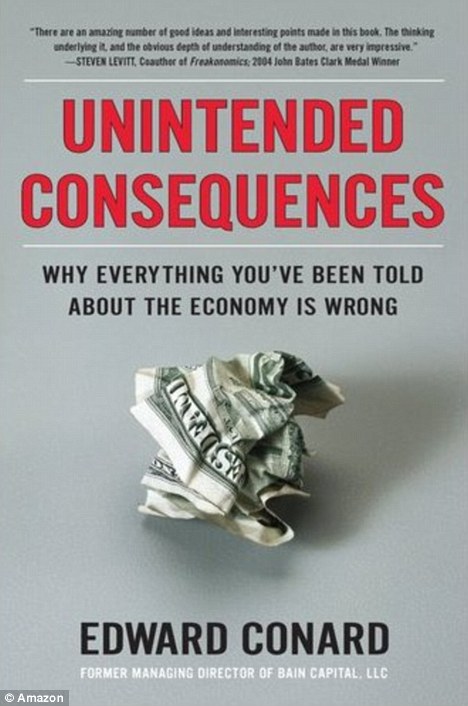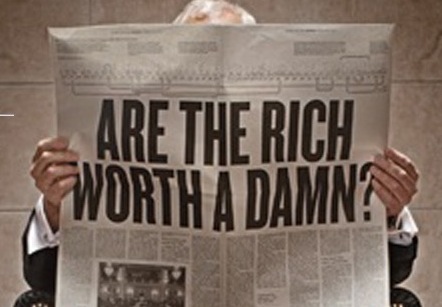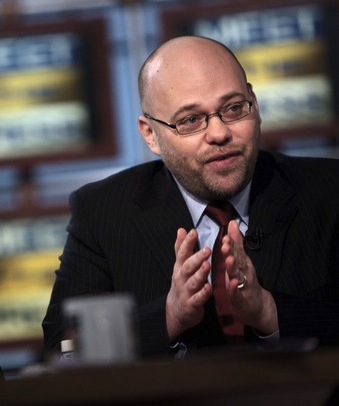This article is cross-posted from Naked Capitalism…
Adam Davidson is moving up in the world. He has gone from fellating the 1% to the top 0.1%.
But bear in mind that we can’t hold Davidson solely responsible for his latest assault on common sense, decency, and most important accuracy. It was the editors of the Sunday Magazine that not only decided to showcase an interview with Mitt Romney’s uber wealthy former partner Edward Conard (“The Purpose of Spectacular Wealth, According to a Spectacularly Wealthy Guy“) but to give it a full 6 pages (per my browser) and put it on the magazine cover. Conard says his new career is to “make his case for a new, decidedly pro-investor way to think about the economy.” And what follows is half-baked, largely inaccurate, unabashed propaganda.
Now admittedly, Davidson as interlocutor gets to have it both ways. He presents Conard’s arguments pretty much straight up for the first half of the piece, and treats them and Conard with a good deal of respect (well, save Conard’s view of the crisis, that is was a run on sound banks which is utterly batshit, and Davidson does pause to intimate that). For instance, after pointing out that Conard is heretofore best known in the wider world as being a mystery Romney funder at the center of a pending scandal that went poof when Conard outed himself, Davidson suggests he might be media wary. But no, this is how Davidson described his first meeting:
Over lunch with editors from The Times Magazine, Conard proved the exact opposite. He looks like a benign middle-aged guy until he starts making an argument. At which point, Conard stares into your eyes and talks with intense force, punctuated by the occasional profanity, in full paragraphs. He delighted in arguing over corporate-bond rates and Chinese central-bank policy, among other arcane minutiae. It also became clear that he had exhaustively thought through the role of the superrich in our economy, and he wasn’t afraid to share those opinions.
This introduction to Conard as a real person segues into an overview of Conard as an icon of successful risk-taking (a theme in Conard’s book, due out next month, which this story also has the unfortunate effect of promoting): born into a middle class family, rising through consulting firm Bain to become partner, leapfrogging to M&A boutique Wasserstein Perella, taking a pay cut to go for greater upside by returning to the Bain fold, but this time at private equity firm Bain Capital.

Aside from the description of Conard’s devoid-of-reality take on the crisis, Davidson uncritically recites his views in the first half of the story and then only, all too politely, as no doubt fits in a world where men like Conard deserve deference, questions his ideas towards the end.
But even with this unduly respectful treatment, the picture that emerges is stunning. Conard is in fact a living, walking homo economicus. If he were written up in a novel, he’d be treated as a ridiculous parody. He treats finding a mate like a shopping exercise, and recommends a sampling phase prior to a selection phase. He thinks philanthropy is bad and money should go only to investments:
During one conversation, he expressed anger over the praise that Warren Buffett has received for pledging billions of his fortune to charity. It was no sacrifice, Conard argued; Buffett still has plenty left over to lead his normal quality of life. By taking billions out of productive investment, he was depriving the middle class of the potential of its 20-to-1 benefits. If anyone was sacrificing, it was those people. “Quit taking a victory lap,” he said, referring to Buffett. “That money was for the middle class.”
And, not surprisingly, Conar denies that rent seeking occurs any place other than despotic third world countries.
But it isn’t simply that the overly polite questioning of Conard’s utilitarian world view is too mild and comes too late. It is that Davidson happily recites things that are simply untrue. And to make matters worse, if my readership is any indicator, many people don’t get past the first page or two of this piece before deciding they’ve read plenty and so get a full dose of claptrap before tuning out.

This is what a risk-takin’ job creator looks like…
The article is chock full of blatant falsehoods. Let’s start with Conard’s personal Big Lie: that he is a risk taker and risk taking is good. All you have to do is look at his career to see that it contradicts both claims. He sees himself as a risk taker because…hold your breath…he went to Harvard Business School rather than going to law school! I graduated from HBS the year before Conard, and was accepted by both top law schools and business schools. Anyone with an operating brain cell will tell you that the fancy grad school route, particularly back then, when tuitions were vastly lower, was a risk averse strategy. You get good grades, show up for job interviews wearing a decent suit and exhibit at least adequate social skills, and you are guaranteed a well paid job.
And of the career choices of a newly minted MBA in the early 1980s, the big consulting firms were the least risky path on offer. Unlike Wall Street, where even first year pay had a meaningful bonus component, consulting firms pay high salaries. And they hysterical thing is he repeatedly rags on lawyers as prototypical people who “don’t maximize their wealth creating potential.” Yet he went on a path exactly like that. Consulting firms take fees, like law firms, and have explicitly modeled their pay and promotion structures on law firms’. He then went to Wasserstein (another firm which takes fees, albeit largely dependent on whether deals get done), which was already an established powerhouse, hence pretty much nada in the way of financial downside in joining them. And partners in private equity firms do not take risk either. PE firms get 2% of the funds under management and 20% of the upside. Partners may but are not required to invest along side the limited partners.
Conard has absolutely no clue about what entrepreneurship is about. Experts on entrepreneurship, like Amar Bhide, who has done considerable research into Inck 500 companies and entrepreneurship generally, have found that the top performers have founders who have very high ambitions and are good at minimizing risk.

Another Big Lie that Davidson promotes is Conard’s claim that the sort of investing he did at Bain Capital and that wealthy people do generally. Earth to base, academic studies have shown that PE fund returns are due to financial engineering and application of leverage. They don’t nurture companies. Anyone who has been in an PE investee company will tell you they are aggressive cost-cutters and investment minimizers. Anything to boost cash flow and facilitate a flip at a higher price to a corporate buyer or public shareholders goes. Ex angel investors or long-term owners of private companies who reinvest their profits, the investments of the uber wealthy are in established companies, the overwhelming majority of the time in secondary trading of securities (which means they are simply cashing out other investors rather than providing growth capital). And for public businesses, the biggest source of investment funds is retained earnings, second is debt financing, and the occasional stock sale is a distant third.
Davidson says things that are factually incorrect in parroting Conard’s argument (and notice how he depicts it as cogent):
Conard, however, has laid out a tightly argued case for just how much consumers actually benefit from the wealthy. Take computers, for example. A small number of innovators and investors may have earned disproportionate billions as the I.T. industry grew, but they got that money by competing to constantly improve their products and simultaneously lower prices. Their work has helped everyone get a lot more value. Cheap, improved computing helps us do our jobs more effectively and, often, earn more money. Countless other industries (travel, telecom, entertainment) use that computing power to lower their prices and enhance their products. This generally makes life more efficient and helps the economy grow.
First, it’s clear Conard never heard of Moore’s law as the driver of falling computing costs.
Second, investors had comparatively little to do with the growth and success of the computing industry (and in general this is true. Bhide has found that only 1/4 of the Inc 500 companies were venture capital funded). If you look at the PC revolution (which was when the real falls in price and growth in reach of computers took place), the drivers were geek tinkerers and hobbyists who all wanted to create a new Hewlett Packard. HP was founded in 1939 and it grew into a dominant Silicon Valley player in the 1950s and 1960s, when top Federal marginal income tax rates were over 90% in the later 1950 and over 70% in the 1960s. Silicon Valley came into being thanks to the work of engineers who clearly were not motivated by dreams of becoming Filthy Rich, since it was pretty much impossible back then.
If you look at the iconic companies of the 1980s tech revolution, few had venture capital or wealthy individuals as backers. Apple funded itself off of purchase orders. Software firms like Microsoft and Oracle didn’t need meaningful seed money. Cisco didn’t take VC until shortly before its IPO so as to get a better multiple.
Third, the internet was created by the Federal government (remember them?). Unix, still the most robust computing platform, was funded by heavily regulated and highly profitable monopoly AT&T, not by wealthy investors. These are also important parts of the tech infrastructure.
We also have stuff like this:
There is a huge mechanism constantly trying to seek out and support these new ideas — entrepreneurs, multinationals and, crucially for Conard, investment firms and hedge funds and everyone down to individual bond traders…In a competitive market, all that’s left are the truly hard puzzles. And they require extraordinary resources. While we often hear about the greatest successes — penicillin, the iPhone — we rarely hear about the countless failures and the people and companies who financed them.
This is how bad things have gotten, that Davidson and Conard dare suggest that the discovery and solving of production problems for penicillin had anything to do with homo economicusgrasping for the brass ring. Don’t New York Times fact checkers know how to use Wikipedia?
[Alexander] Fleming finally abandoned penicillin, and not long after he did, Howard Florey and Ernst Boris Chain at the Radcliffe Infirmary in Oxford took up researching and mass-producing it, with funds from the U.S. and British governments. They started mass production after the bombing of Pearl Harbor. When D-Day arrived, they had made enough penicillin to treat all the wounded Allied forces.
So penicillin was the product of a persistent but unsuccessful effort of a brilliant researcher (Fleming was highly regarded even before the potential of his penicillin discovery was realized), carried forward by researchers at Oxford (risk averse academics!) funded by the government (horrors!) who made the critical production breakthroughs.
And the iPhone was very much a product of Steve Jobs’ vision, and Steve Jobs flies in the face of the World According to Mr. 0.1%. Consider this diatribe:
What are they doing, sitting here, having a coffee at 2:30?” he asked. “I’m sure those guys are college-educated.” Conard, who occasionally flashed a mean streak during our talks, started calling the group “art-history majors,” his derisive term for pretty much anyone who was lucky enough to be born with the talent and opportunity to join the risk-taking, innovation-hunting mechanism but who chose instead a less competitive life.
Conard must not believe in art of any kind. Can’t a rich guy like him see the need of art educated adults, if nothing else, to help curate his collection, to inform the aesthetics of architects and city planners? And the decorators I know are plenty entrepreneurial, far more so than “never took a real risk” Conard.
In addition, Conard apparently does not read newspapers and has not heard that unemployment is really high these days. He clearly labors under the delusion that anyone not working is a dilettante. I’d hazard that at least some of these Starbucks denizens are underemployed and go there to get out of the house (yours truly also did a lot of work on ECONNED at Starbucks for similar reasons).
Most important, Steve Jobs, the capitalist’s wet dream, did everything Conard rails against: took art courses, didn’t graduate from college, followed his inner muse (doing drugs, spending a year in India).
But the key to Conard is in that last section. He doesn’t revere risk taking. He reveres competition and numbing overwork. Davidson close to the end picks up on that:
The world Conard describes too often feels grim and soulless, one in which art and romance and the nonremunerative satisfactions of a simpler life are invisible. And that, I realized, really is Conard’s world. “God didn’t create the universe so that talented people would be happy,” he said. “It’s not beautiful. It’s hard work. It’s responsibility and deadlines, working till 11 o’clock at night when you want to watch your baby and be with your wife. It’s not serenity and beauty.”
His vision is the logical outcome of the belief system of early industrialists, who needed to justify their exploitation of formerly self sufficient farmers. Per Yasha Levine:
English peasants didn’t want to give up their rural communal lifestyle, leave their land and go work for below-subsistence wages in shitty, dangerous factories being set up by a new, rich class of landowning capitalists. And for good reason, too. Using Adam Smith’s own estimates of factory wages being paid at the time in Scotland, a factory-peasant would have to toil for more than three days to buy a pair of commercially produced shoes. Or they could make their own traditional brogues using their own leather in a matter of hours, and spend the rest of the time getting wasted on ale. It’s really not much of a choice, is it?…
Faced with a peasantry that didn’t feel like playing the role of slave, philosophers, economists, politicians, moralists and leading business figures began advocating for government action. Over time, they enacted a series of laws and measures designed to push peasants out of the old and into the new by destroying their traditional means of self-support.
Levine quotes a book by Michael Perleman, The Invention of Capitalism, which cites numerous tracts bewailing the idleness of the lower orders (notice this was never perceived to be a problem prior to the Industrial Revolution). For instance:
Our Forests and great Commons (make the Poor that are upon them too much like the Indians) being a hindrance to Industry, and are Nurseries of Idleness and Insolence.
So Conard celebrates competitiveness, when he managed to find his way onto the low-risk elite path when it was less crowded than today. And high income disparity serves that end. If you lose your economic perch, unlike in more equal societies, you are almost certain to lose most of your putative friends. If you can’t socialize at their level, over time you disappear from their set (and that’s before you factor in the possibility of serious budget problems). Yet as you peel the layers back, despite his confidence that the world would work better if it was mashed into his template, it sounds utterly miserable.
Just because someone has an internally consistent world view does not make it accurate. Fans of slavery, alchemy, the Inquisition, trial by combat, and Ptolemaic astronomy all had logical looking arguments supporting their now discredited views. Conard at first seems to yet another evangelist of a hopelessly flawed and dangerous orthodoxy, and the more he speaks, the more he seems to be deeply imbalanced, so intensely invested in his distorted personal mythology that he is driven to make the world at large reflect it back. It would be far better for Davidson and the New York Times to treat people like Conard as epitomes of deep-seated cultural pathologies, rather than promote them.
Update: In a misrepresentation I missed (hat tip Lynn Parramore), Davidson cites Dean Baker as supporting Conard’s views. Baker objects:
At one point, the piece cites me as saying that for each dollar earned by investors (corporations), the rest of society gets five dollars.
This should not sound surprising. This is simply the division of national income between capital and labor. The after-tax capital share of corporate income is roughly one-sixth of total income. This means that if GDP increases by $1 billion, then capital will typically get around $160 million, with the rest going to labor and corporate taxes.
Note that this does not mean that investors are responsible for this $1 billion increase in output. Their actions contributed to the growth of output in the same way as did the actions of workers and the government. The misleading part of the picture is Conard’s implication that if not for the heroic investor, none of this wealth would have been created.
In standard economic theory if one investor had not put money to use, then another one would have have. The difference in output would have been trivial.
This article is cross-posted from Naked Capitalism…
Read more: banana republic, Banking industry, Free markets and their discontents, Income disparity, Media watch, private equity, propaganda, shills, Social policy, Social values, The destruction of the middle class, The dismal science, Yves Smith, Class War For Idiots


Got something to say to us? Then send us a letter.
Want us to stick around? Donate to The eXiled.
Twitter twerps can follow us at twitter.com/exiledonline
















24 Comments
Add your own1. TG | May 3rd, 2012 at 10:49 pm
“And to make matters worse, if my readership is any indicator, many people don’t get past the first page or two of this piece before deciding they’ve read plenty and so get a full dose of claptrap before tuning out.”
I had the same response. It was just logical fallacy after falsehood after demonstration of ignorance, all going unchallenged by Davidson and the other boot-lickers. The nasty, self-satisfied attitude of this joyless Calvinist greedhead made it unbearable, but the cavalcade of unchecked nonsense was what caused me to stop reading.
I mean, this twit actually claims that greater income inequality is a good thing for a country’s economic health, and they respond with … nothing. It would have taken 2 minutes to pull up a world ranking of Gini Co-efficients on an iPad, and another minute to ask this Galtian superman to demonstrate how the per-capita savings and investment rates and prosperity in places like Lesotho and Haiti and Bolivia (with massive inequality) beat out Sweden and Japan.
I guess we now know Davidson and co.’s answer to NYT Public Editor’ Arthur Brisbane’s ridiculous query a few months back about whether Times “reporters should challenge ‘facts’ that are asserted by newsmakers they write about”: a resounding no.
What a pathetic joke of an NYT Magazine article this was.
2. Davrus | May 4th, 2012 at 1:04 am
“It’s not beautiful. It’s hard work. It’s responsibility and deadlines, working till 11 o’clock at night when you want to watch your baby and be with your wife. It’s not serenity and beauty.”
My first question is whether or not theses idiots will ever work out that in this future dystopia, there will inevitably be a surplus useless junk produced, with pretty much no one capable of buying them, and that even if they did have the money they wouldn’t have the free time anyway.
My second question is, if they did would they scrap the whole idea, or would they just start burning the merchandise on some kind of altar and start crediting it against God’s account.
3. gc | May 4th, 2012 at 7:19 am
^ This is rather brilliant.
4. DeeboCools | May 4th, 2012 at 7:29 am
Welcome to Hong Kong.
5. Urda | May 4th, 2012 at 7:41 am
“God created the Universe”
And creation will always require correction.
6. sixpackcompact | May 4th, 2012 at 11:20 am
@4, not really. Half the population lives in public housing, people largely just pretend to work hard (though long hours are part of the subterfuge), the bosses are all fools, and well-dressed girls who pretend to work hard will go out with you no matter what sort of a worthless penniless white dickhead you are. I don’t see the relevance, myself.
7. andy | May 4th, 2012 at 12:41 pm
Sounds good – wish we’d never given the place back, now, I could do with a bolt-hole 🙂
“My second question is, if they did would they scrap the whole idea, or would they just start burning the merchandise on some kind of altar and start crediting it against God’s account.”
That’s why the rich start so many frigging wars. Gotta destroy that surplus value somehow!
8. Damn Red | May 4th, 2012 at 10:31 pm
Here is how you can tell if your work is hard. You must put in the hours or you starve and you are required to sell your labor to some rich cunt to do so and you are dependent on being able to sell said labor. I hate listening to these assholes bitch about the long hours they put in. Try this put in long hours to pay for classes/food/family and then take what ever free time you have left to plod slowly through your graduate education in an engineering/science field. Then tell me you bust your ass and going home at 11PM that’s light weight shit I am lucky if I sleep at 2AM. The only difference between me and the wealthy is my work actually produces something of value. and I will never become rich.
And to rebuke conrad and the cock suckers that defend him.
I took the bigger risk, I actually believed working with my actual labor would pay off.
9. damn red | May 5th, 2012 at 3:14 am
I honestly think organizing a book burning of this work is in order.
10. Martin Finnucane | May 5th, 2012 at 7:18 pm
Adam Davidson is a sack of poo. Smelly poo, like from a dog that’s been eating table scraps instead if proper kibble, with a few disgusting, squirmy intestinal worms wading in the foul muck:
http://www.npr.org/blogs/money/2009/05/hear_elizabeth_warren_checks_i.html
11. Trevor | May 6th, 2012 at 6:49 am
Conard’s whole spiel is just a less Harlequin-style retread of Rand’s bullshit.
And what’s really ridiculous about this old meme is it’s not even good capitalism – “I am teh wealthy job creatorz! What is ‘demand?'”
12. DeeboCools | May 6th, 2012 at 7:56 am
I stand corrected. Welcome to Hell.
13. Anarchy Pony | May 6th, 2012 at 9:29 am
Why isn’t Wall Street burning, America? It should be cinders and rubble by now.
14. Zog | May 6th, 2012 at 11:10 am
I’ve never heard of, or read anything written by, this Adam Davidson cunt. I do belive however that there is value in letting idiots talk. Often the worst thing you can do to someone is just transcribe their thoughts and publish them for the whole world to read. With his opinions now indelibly on the record, are there any doubts that a proper US revolution would include a bullet in the back of the head or a plank bunk in the gulag for Mr Conard?
15. cblood | May 6th, 2012 at 11:16 am
The only thing that extinguished my rage after reading the original piece was that the “readers picks” for top comments, I read the first like 300, they were ALL tearing it to shreads : )
Here is one I particularly liked:
Money’s not everything. If there was more financial stability in innovation, I would spend more time in it… oh, wait. There is, and I do. It’s called research and academia. And I’m happy to do it without the promise of riches that Conard claims is needed to draw people into the so-called “competitive economic mechanism.” Financial risk-takers shouldn’t be rewarded ridiculous sums of money, any more than I should be. They should receive a reasonable return on their money, like the rest of us, who are trying to live our normal lives and who each hope to improve the world a little bit.”
RIGHT ON.
16. Davrus | May 6th, 2012 at 10:01 pm
#15
Currently I’m doing a doctorate in computer science. One of the biggest disincentives I have towards developing new innovative ideas, is the suspicion that if I do come up with something brilliant rather than creating a better world where things become easier for everybody, it’ll just be used lay people off and drive wages down for the middle to bottom rungs of society.
17. TD | May 6th, 2012 at 11:00 pm
The sooner we kill these bloodsuckers and hang their corpses from the spires of their mansions, the sooner we can start colonizing space and shit.
18. luther blissett | May 7th, 2012 at 8:04 am
Conard by name, connard by nature.
As for Davidson, he and the other smug bastards of the Planet Money propaganda team must love how they haven’t been found out because they sound like This American Life and Radiolab.
19. Generalfeldmarschall von Hindenburg | May 7th, 2012 at 1:14 pm
It’s a sure sign of complete dysfunction that we have an utterly miserable ruling class. This is the final rank flowering of Calvinism and an Existentialist-Cartesian mechanistic view of existence.
20. anonymous coward | May 7th, 2012 at 3:30 pm
@17 You disgust me. What a waste.
21. DrunktankDan | May 7th, 2012 at 4:51 pm
You would think that a county with such robust 2nd amendment rights wouldn’t tolerate these fuckheads walking around in public places. Hell, what is the percentage of ex infantry with decent shooting skills that lost their houses to these creeps? Forget that, how many 12 year olds with a hunting rifle have had to hear their dad talk about losing his job at the plant thanks to offshoring?
Greyhound tickets to New York are cheap.
Just sayin’.
Hi FBI!
22. DrunktankDan | May 7th, 2012 at 8:08 pm
oops, meant *country*
23. Goofi | May 9th, 2012 at 8:50 pm
JIM GOAD SUCKS KOCH.
24. Dave | June 1st, 2012 at 10:21 pm
This guy may be full of shit but he’s going to get paid a LOT of money.
Good propaganda people (Limbaugh) are a great value and are fellated properly. Misinformation can pay excellently.
Leave a Comment
(Open to all. Comments can and will be censored at whim and without warning.)
Subscribe to the comments via RSS Feed